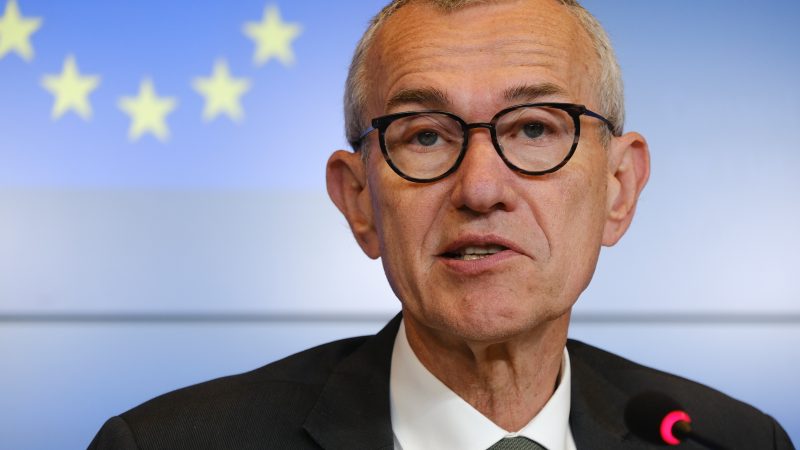Europe needs a “real” European Health Union to guarantee the survival of national health systems, Frank Vandenbroucke writes ahead of the Health Council meeting on Friday (21 June).
Frank Vandenbroucke is Belgium's Deputy Prime Minister and Minister of Social Welfare.
There is no denying that European health systems will face unprecedented stress over the next decade. Ageing populations, increases in obesity and other chronic diseases, medicine shortages and waves of healthcare worker retirements are causing ever-increasing strains.
We need to prepare for the devastating effects of climate change – pandemics, heatstroke, floods, tropical diseases – as well as the transformative potential of AI.
This will force us to rethink our health care system, redistributing labor and skills among the health workforce and leveraging technological innovation to address the shortage of health professionals.
To ensure supplies of medicines, we must rethink how we produce and procure them. To reduce the burden of disease on our systems, we must embrace prevention in deeds and not just words. And as we live in a world of multifaceted risks, we must prepare for the unexpected.
Europe needs to intervene to prevent parts of national health systems from collapsing, not by replacing national policies but by creating a supportive “holding environment”. This is the aim of a true European Health Union.
For six months, EU health ministers have been engaged in intensive discussions about what a European Health Union should work on.
An ambitious programme for the next Commission has emerged, answering eight challenges: medicine shortages, health worker shortages, preventing non-communicable diseases, addressing unmet medical needs, fighting antimicrobial resistance, developing an EU ecosystem for clinical trials, crisis preparedness, the health and climate change agenda and improving EU implementation tools. Rather than going into detail about each challenge, I would like to give two examples.
Medicine shortages
Essential medicines have disappeared from the market. In the past few months, there have been shortages of life-saving medicines, including cancer treatments, antibiotics and blood thinners. Patients have been told to postpone treatment or drive hundreds of kilometres across Europe to find their medication.
At its core is a flawed economic model that rewards producers for producing cheaply, rather than considering security of supply or the environmental and working conditions in which their products are made.
This is why essential medicines currently come mainly from China and India. Global dependence on Asia has a dark side: war, factory fires, quality issues, or a ship running aground in the Suez Canal can quickly have dire consequences for patients around the world.
The EU has already outlined plans to reduce reliance on semiconductors, green energy and critical raw materials, but has neglected pharmaceuticals for too long.
This changed with the announcement of the Critical Medicines Alliance, a partnership between the European Commission, governments, industry and civil society tasked with developing solutions to increase security of supply.
However, unlike chips, net-zero industry and critical raw materials, there is still no legal framework to guide action on the production and procurement of medicines. Therefore, the next Commission will need to prepare a Critical Medicines Act, just as it has drafted the Chips Act, the Net-Zero Industry Act and the Critical Raw Materials Act.
Meeting growing health needs
Most countries report severe shortages of health workers. The answer is multifaceted: to reduce the strain on the system from ageing and chronic diseases, people need to stay healthy for longer.
We must therefore step up the fight against tobacco and excessive alcohol consumption and put more nutritious food in our supermarkets. The EU has legislative powers that enable member states to implement more efficient measures, such as tobacco taxes and the labelling of alcohol and food.
Most of these measures were identified in the European Cancer Plan but not implemented. An ambitious EU policy on disease prevention would significantly strengthen national policies.
At the same time, the health profession needs to be reformed so that nurses, doctors and other caregivers can be employed more efficiently and make the most of what new technologies such as AI have to offer.
The EU can also play an active role here by being at the forefront of innovative thinking and organising the necessary dialogue with Member States and social partners on the health profession of the future.
We are all stepping into uncharted territory. We must learn from each other. EU internal market rules have a significant impact on workforce organisation through the Occupational Qualifications Directive, so legislative action is likely to follow.
It's time to take action
Until recently, health ministers were reluctant to urge the European Commission to prioritise health, given the nuances of national competences. But the experience of the COVID-19 pandemic, international market failures and climate change have changed times: we need a true European Health Union if we want our health systems to survive.
Thus, for the first time, the EPSCO Council will advance an ambitious health agenda. Ministers have defined the EU's field of action. The next Commission will take up the baton.



